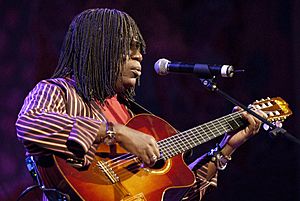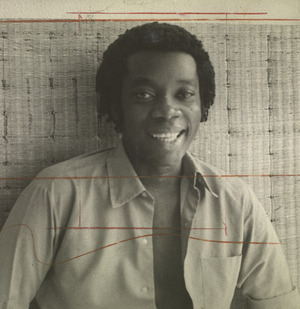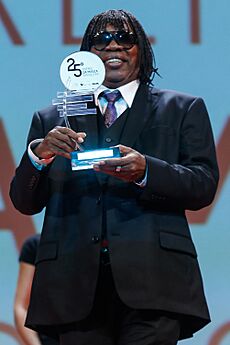Milton Nascimento facts for kids
Quick facts for kids
Milton Nascimento
|
|
|---|---|

Nascimento performing in 2008
|
|
| Background information | |
| Also known as | Bituca |
| Born | October 26, 1942 Rio de Janeiro, Brazil |
| Origin | Três Pontas, Minas Gerais, Brazil |
| Genres | MPB, pop rock, rock and roll, jazz, soft rock, afrobeat, worldbeat, adult contemporary |
| Occupation(s) | Singer, songwriter, guitarist |
| Instruments | Vocals, guitar, piano |
| Years active | 1962–present |
| Labels | Warner Music Brazil Universal Music Brazil Sony Music Brazil Philips, Mercury, CTI EMI Music Brazil Warner Bros. Records Blue Note/EMI Records Nonesuch/Elektra Records |
| Associated acts | Clube da Esquina |
Milton Silva Campos do Nascimento (born October 26, 1942), often called Bituca, is a famous Brazilian singer, songwriter, and musician. He plays many instruments.
Milton Nascimento has made 32 studio albums. He has won five Grammy Awards, which are big music prizes. One Grammy was for "Best World Music Album" in 1998 for his album Nascimento. He also won twelve Brazilian Music Awards. He has worked with many other artists like Björk, Pat Metheny, Caetano Veloso, and Elis Regina.
Contents
Milton Nascimento's Early Life
Milton Nascimento was born in Rio de Janeiro, Brazil. His mother, Maria do Carmo do Nascimento, was a maid. She raised him alone until she passed away when he was two years old. After that, his grandmother took care of him.
Milton was later adopted by Josino Brito Campos and Lília Silva Campos. Josino was a bank worker and teacher, and Lília was a music teacher. They moved to Três Pontas, in the state of Minas Gerais. When Milton was a child, people called him "Bituca." This nickname came from how he would pout when he was upset.
How Milton Started in Music
Milton became interested in music because of his adoptive mother. She had studied music with a famous composer named Heitor Villa-Lobos. When Milton was four, he received an accordion and began to sing.
At 13, he started singing in a group called Continental de Duilio Tiso Cougo. Milton also sometimes worked as a DJ at a radio station his father used to run. He lived in different neighborhoods in Rio de Janeiro.
In 1968, Milton married a student named Lurdeca. Their marriage was short. After this, he decided to focus on his music career. Later, in 2016, he adopted a son named Augusto Kesrouani do Nascimento.
The Clube da Esquina Movement
Early in his career, Milton played in two samba groups. He also played with the group W's Boys. In 1962, he recorded his first song, "Barulho de Trem." A year later, in 1963, he moved to Belo Horizonte. There, he became good friends with Lô Borges. This friendship led to the start of the Clube da Esquina ("street corner club") movement.
What Was Clube da Esquina?
The Clube da Esquina was a group of musicians. Members included Beto Guedes, Toninho Horta, Wagner Tiso, and Flávio Venturini. They shared their songs and musical ideas. One of their songs was "Canção do Sal." Singer Elis Regina first performed this song in 1966. This led to Milton appearing on television. The group released their famous album, Clube da Esquina, in 1972. They also released several hit songs.
In 1967, Milton entered the Festival Internacional da Canção. He won second place with his song "Travessia" ("Bridges"). This helped him get a contract to record three albums with Creed Taylor. Milton then moved to the United States to record his album Courage in 1969.
Milton Nascimento wrote many well-known songs. These include "Nada Será Como Antes" ("Nothing Will Be As It Was") and "Maria, Maria." Another famous song is "Coração de Estudante" ("Student's Heart"). This song was about a student who passed away in 1968. It became an important song for a political campaign in 1984. It was also played at the funerals of important figures like President-elect Tancredo Neves and race car driver Ayrton Senna.
Milton's Global Music Journey
Milton Nascimento was already very famous in Brazil. But he became known worldwide after appearing on jazz saxophonist Wayne Shorter's album Native Dancer in 1974. This made him very popular internationally.
Working with Other Artists
After Native Dancer, Milton worked with many famous musicians. These included Paul Simon, Sarah Vaughan, Mercedes Sosa, Carlos Santana, Pablo Milanés, Cat Stevens, George Duke, Quincy Jones, and Earth, Wind And Fire. His 1994 album Angelus featured many stars. Some of them were Pat Metheny, Ron Carter, Herbie Hancock, Jack DeJohnette, Nana Vasconcelos, Jon Anderson, James Taylor, and Peter Gabriel.
Through his friend, guitarist Warren Cuccurullo, Milton also worked with the pop rock band Duran Duran in 1993. He helped write and sang on their song "Breath After Breath." This song was on Duran Duran's 1993 album. He also performed with the band when they toured Brazil. In 1996, Milton contributed the song "Dancing" to an album that raised money for AIDS research.
Ser Minas Tão Gerais and Other Projects
In 2002, Milton Nascimento starred in a musical play called Ser Minas Tão Gerais. This play honored the poetry of Milton and Carlos Drummond de Andrade. Both are famous poets from Minas Gerais.
In 2004, he worked with the Brazilian heavy metal band Angra. He sang on their song "Late Redemption" from the album Temple of Shadows. In 2016, Milton received an honorary Doctor of Music degree from Berklee College of Music. This is a special award for his contributions to music.
In 2018, Milton released two EPs, A Festa and Nada Será Como Antes. These EPs featured new acoustic versions of his older hit songs.
Recent Collaborations and Farewell Tour
In 2020, Milton Nascimento released Existe Amor. This was a four-song EP with the rapper Criolo. The EP was part of a project to help Brazilians in need during the coronavirus pandemic.
On October 26, 2021, his 79th birthday, Milton announced his 2022 farewell tour. It was called A Última Sessão de Música (The Last Music Session). He later said he was not quitting music entirely, just touring. The tour's name came from a song on his 1973 album Milagre dos Peixes. He played his last concert on November 13, 2022, at the Mineirão stadium in Belo Horizonte.
On November 15, 2023, Milton released Outros Cantos. This was a collaborative album with the Brazilian country music duo Chitãozinho & Xororó.
On May 15, 2024, Milton announced a new album with American musician Esperanza Spalding. It was called Milton + Esperanza. They recorded it in Brazil in 2023. The album was released on August 9, 2024, and received great reviews. It was nominated for "Best Jazz Vocal Album" at the 67th Annual Grammy Awards. On October 29, 2024, Milton released the EP Moon Over Minas. This was with American musician Jonathan Wilson. The EP was recorded when Wilson was touring Brazil. Even though Milton said he was retiring from live concerts, he appeared in an NPR Tiny Desk (Home) Concert on August 7, 2024. He performed songs from the Milton + Esperanza album with Esperanza Spalding and other artists.
Milton Nascimento's Music Albums
|
Studio albums
Extended plays
Compilations
Guest appearances
|
Awards and Special Recognition
- Latin Grammy Lifetime Achievement Award (2012)
- Honorary Doctorate of Music, awarded by Berklee College of Music (2016)
See also
 In Spanish: Milton Nascimento para niños
In Spanish: Milton Nascimento para niños
 | Audre Lorde |
 | John Berry Meachum |
 | Ferdinand Lee Barnett |



